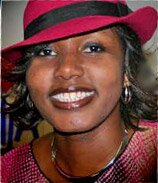Young People 18-24 Targeted in Get-Out-the-Vote Drives
|
Damien Filer, a longtime activist in Florida, helped to organize Election Protection, a national outreach drive that encourages young people, among others, to vote. His target was his own state, where the vote tally proved critical in the 2000 presidential election. A four-week program called C.A.M.P. Florida reached out to African American communities in rural north Florida this summer, focusing on voter registration and voter education. The college students who went out to register voters told Filer there was a common theme in the comments of young people. “They feel so unempowered by the political system,” said Filer.
“Communicating to them [that] they can make a difference is like yelling across a canyon.” C.A.M.P. Florida was just one of many campaigns attempting to engage young voters this year so they will register and cast their ballots in November. Only 42 percent of eligible young people, ages 18 to 24, voted for president in 2000. Among African Americans in that age group, the percentage is much lower, at least as measured in the 1996 election. Approximately 28 percent of African Americans age 18-24 voted then, according to the Center for Information and Research on Civic Learning and Engagement, based at the University of Maryland. Both major political parties claim to have stepped up their efforts to urge young people to vote in November. A Democratic National Committee program, “Something New,” was set up to “energize” young people through voter registration drives, concerts and policy forums.
The Republican National Committee says it has 55,600 team leaders who aim to engage young adults at the grass-roots level. The committee has teamed with MTV to promote its essay contest “Stand up and Holla!” about the importance of community service. The winner, Princella Smith of Ouachita Baptist University in Arkadelphia, Ark., is to speak at the Republican National Convention Aug. 31. In July, hip-hop icon Sean “P. Diddy” Combs introduced a new organization, Citizen Change, which hopes to educate and motivate young Americans to vote in the 2004 election. Combs said he wanted to reach out to the hip-hop generation, which he has dubbed “the forgotten ones.” Among the Citizen Change supporters is Kweisi Mfume, president of the NAACP. “Young people are disproportional[ly] affected by unemployment right now,” said Ivan Frishberg, spokesman for the New Voters Project, a grassroots youth voter registration and mobilization campaign that plans to register 265,000 new voters this year in Colorado, Iowa, Nevada, New Mexico, Oregon, and Wisconsin. “Their concern over the availability of health care brings the importance of the election home to young people. They are more engaged than ever before.” A March 2004 Harvard University Institute of Politics poll of 1,205 undergraduates indicated that 62 percent of them would “definitely vote” in the 2004 election. Two-thirds of young people surveyed in the poll said they believed it would be difficult to find a job after graduation. The New Millennium Survey, conducted by the National Association of Secretaries of State, indicated that the “economy/jobs” issue was the No. 1 cause for concern for both college undergraduates and graduates. “The election is likely to be decided by a small number of voters,” said Frishberg. “The candidates are focusing on all people, including young people. There are 28.5 million 18- to 24 year-olds. You can’t ignore a population that size.” But not everyone is optimistic that the presidential candidates will acknowledge young people’s concerns. “The important issues for the 18-25 demographics have not been addressed, but they have not asserted themselves through voting since 1972,” said David Bositis, senior political analyst for the Washington-based Joint Center for Political and Economic Studies, via e-mail. That is not deterring the Florida effort. Filer’s group, Election Protection, is a coalition of local, state and national organizations trying to protect voter rights in more than 30 states during the upcoming election. It is led by the Lawyers' Committee for Civil Rights, the National Coalition on Black Civic Participation and the People for the American Way Foundation. Recruits at C.A.M.P. Florida came from the African American Ministers Leadership Council, from historically black colleges and universities, and from campus networks. Some were volunteers from civil rights and social justice organizations. The four-week outreach that concluded Aug. 15 targeted Escambia, Bay, Jackson, and Gadsden counties, among others in the Panhandle, an area skipped by most previous voter outreach campaigns. “I don’t think anything can compare to a personal connection,” Filer said. “Reaching out just one time might not seal the deal: the more, the better.” Posted Aug. 27, 2004 |
https://blackcollegewire.org/news/040823_voting/
|
Home | News | Sports | Culture | Voices | Images | Projects | About Us Copyright © 2004 Black College Wire. Black College Wire is a project of the Black College Communication Association and the Robert C. Maynard Institute for Journalism Education. |

